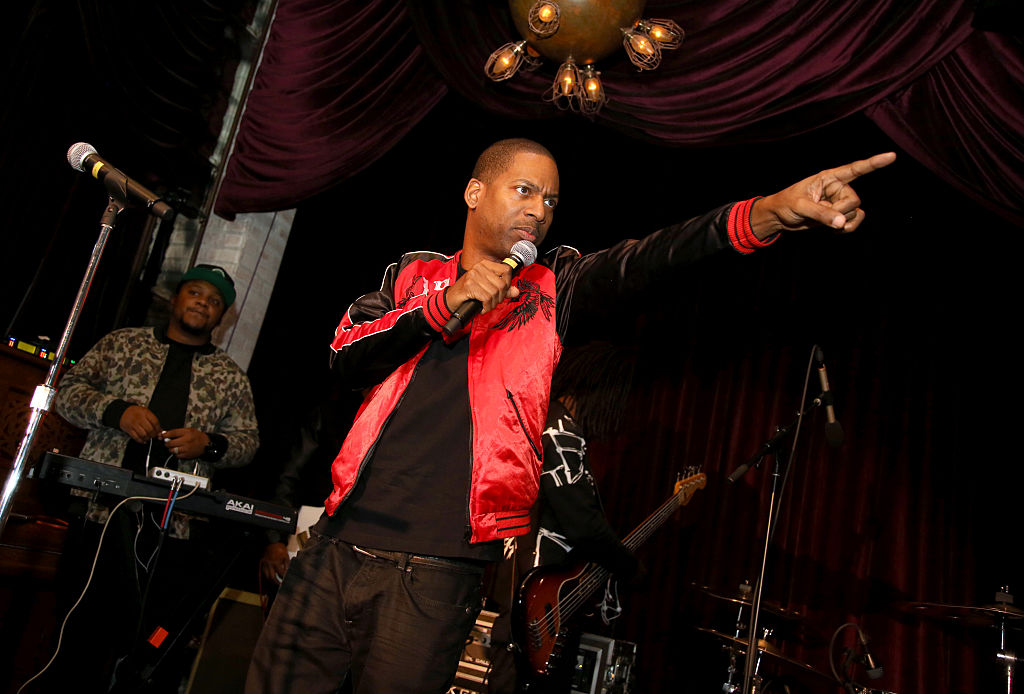Tony Rock talks comedic career, preparing for stand ups and Hollywood strikes
Rock sits down with theGrio's Marc Lamont Hill to discuss the art of stand-up comedy and what inspired him to pursue a career in comedy.
Whether it’s on a TV screen or on a stage, Tony Rock makes us laugh out of our seats.
Rock joined theGrio to discuss his comedy journey and how he became the comedian that we all love.
The following is a transcript of their conversation:

Marc Lamont Hill: Thanks for staying with us on the grill. I am Marc Lamont Hill and back with the comedian, the actor, the legend, Tony Rock, my brother. Talk to me about your career. How did you get started in comedy?
Tony Rock: I’ll try to make a long story very short. I started out, I fell in love with listening to records: Richard Pryor, Bill Cosby, George Carlin. I would go to school the next day and tell all their jokes and get in trouble because I was using “blue language.” Teacher told my mother, my mother said, “You can’t do that. That’s this guy’s job. That’s what he gets paid to do.” I saw Richard Pryor on TV one day and I said, “Hey, that’s the guy from the record.” She said, “Yeah, he does movies, he does TV shows, he does the records.” And I’m like, “Wow, I really want to do that.” And that was the first love. Then I saw Eddie Murphy on SNL years later, and Eddie looked like me and kind of dressed like me, and I was like blown away that a young person that looked like me from Brooklyn, was doing this thing I loved and that furthered my love for it and then when the guy in the next room (Chris Rock) started doing stand up, that made it real for me because Eddie and Richard were just ideals to me. I had never met them, never had a conversation with them but when the guy in the next room, my brother Chris, started doing stand up, then it was real. It was like, “Oh, I can really do this because I can actually touch this guy and talk to this guy. So if he can do it, I can do it.” And years later, after he started, I was in public school. When I got to high school I started writing material. I graduated. [I had] a few down years because my father had passed after I graduated high school. So [I had] a few down years, but then when I got myself focused on life and being the greatest I could possibly be, I said, “Let’s go try standup,” and the rest has been history. I’ve been loving it ever since.
Hill: When you decided on your your style, if it was an actual decision, you got these records in front of you, you got Richard Pryor, Eddie Murphy, which you could say in some ways is a similar style — they’re different, but there’s something there, Bill Cosby’s a whole different lane — then you’ve got your brother who’s a whole different kind of lane: How did you sort of come together or put together your style of comedy, how you felt like you should approach the art?
Rock: I used to sit on a stoop in Bed-Stuy, Brooklyn, and we call it “snapping” — other people call it jonesing or ranking or whatever — we call it snapping. We would sit on a stoop and just snap on everybody on the block. We had so many characters on our block that we would just, anybody who walk past we would just snap on them. And I always felt like that was a strong suit to my style was like, very like, like talking to my friends. So if you ever see me do stand up, I call it “In Conversation with Tony Rock” because it’s topic related, but then there’s portions of the show where I just go into the room and talk to the room or just whatever the feeling is, it like takes it back to the stoop aspect for me and always makes it fun for me and always makes it a new show for the audience. So you can see a Tony Rock show 10 times and see 10 different shows.
Hill: You, since you started in the industry, have taken the path that your family taught you about, right, which is, you know, you act, you do stand up, you do all these different things like Richard Pryor — does comedy still stick with you as the best thing? And I ask that because so many of my favorite comedians don’t take the stage anymore. So many comedians who I love are taking that acting money, and I don’t know if it’s because their love changes or because the checks are bigger, but they don’t do it anymore. So like where does your heart stay and how is comedy in relation to these other arts for you?
Rock: I think they do it because the checks are bigger, I could be guessing, but I think they do it because the checks are bigger, and then it’s so hard to get back to stand up after you haven’t done it for five, six years. It’s very hard to get back to. That’s why if you notice myself and my brother, we never stop. It’s always stand up. We stand up, stand up first and foremost. It will always be first, every opportunity—
Marc Lamont Hill: Why is it so difficult to go back? Because Eddie Murphy said the same thing. He’s like, “I could do a get up but it won’t be funny,” right, when people ask him why he don’t just go back and hit the stage real fast. What makes it so difficult if that’s your first talent?
Rock: Yeah, it’s your first talent, but you have been working at that talent every day, all day when you first start. Eddie’s been away so long, he’s been away longer than he’s been doing it daily. So I could agree, it’s going to be difficult for him to try to get back on stage and be the Eddie that we want to see. See, Eddie can get back on, but if he’s not the Eddie we want to see, he’s going to know it. He’s going to know like … we don’t see him like the way he was. And it’s like being a heavyweight fighter getting beat up in your latter years, it just doesn’t feel good to be “the once was, the the former champion.” It’s not a good feeling.
Hill: When you talk about you, your brother, others who’ve never stopped, who keep doing it every every day or every week or whatever — is that a discipline? Are you writing jokes every day? Are you thinking of material every day? Are you polishing material every day? Like, what does it look like to maintain a comedy kind of discipline outside of just being in the clubs all the time?
Tony Rock: The comedy discipline is this: I write every day, I keep the pad anywhere in the hotel, anywhere in the room when I’m on the road. When I’m home, the pad is next to the bed. It’s everyday, you write everyday. I put paper to pen every single day. I try to get on stage every single night. It’s just a discipline that you grow into, and then to not do it feels weird to you. I do it so much this way, if I’m off stage for maybe two days or three days in a row, I feel weird because I do it so much.
Hill: Do you ever, and this is me playing therapist for a minute, do you ever feel that in your personal life — because you’re so used to people laughing and so used to getting approval from crowds and audiences — does that affect how you navigate people in your regular life who just want you to be regular Tony?
Rock: No it doesn’t. When I get off stage, I turn it off. I don’t even like comics that are on all the time. I don’t see how they do it actually because you have to turn it off so you can observe people and walk amongst the people and write for the people. You’re writing stuff that you want people to say, “I agree with that” or “I disagree with that,” so you can’t be on all the time. If you’re going to write about people, you have to turn it off and be a regular person so that you can be a superhero later.
Hill: Oh, I like that. I like that. Speaking of superheroes, to me some of the superheroes right now are the people who are protesting, the people who are really leading the charge in the writers strike and in the SAG strike. Has the strike affected you?
Rock: Theatrically, yes. There’s no auditions, there’s no — I have a script that was circulating and actually getting a lot of positive feedback, and then the strike happened, so that just — I just put that on the back burner for a little while. I shot my special, I was shopping that and they’re not really looking at anything right now because everybody’s out protesting and, you know, so it has affected me theatrically and as far as like my production stuff, but comedically, no. I get to go on the road and just, you know, take every road gig I want right now because there’s nothing going on in Hollywood.
Hill: It’s funny you say that because, you know, I spend a lot of time interviewing actors and I’ve spent the last two or three weeks interviewing a bunch of actors who keep telling me “yeah, I’m going to do my first comedy show in six months” or “in six years, I’m going to hit the road, I’m going to do a one-man, one-woman show.” It’s like the comedy clubs and the theaters are filling up with people who are trying to fill those gaps, but you were already there, which is what we appreciate about you, man. You’re not doing it just for the money, you’re doing it for the love of the craft. What are you working on right now that we can catch you at? Like, where can we see you, where can we see you to stand up?
Rock: I got San Antonio; Omaha, Nebraska; San Jose and then Oxnard, my next four gigs.
Hill: Oxnard? Where is Oxnard? I’m sorry, I ain’t get that far.
Rock: California. It’s like an hour outside — I think it’s like an hour outside of L.A.
Hill: Oh, wow. Okay, so that’s an interesting thing, too, man, because you don’t just do the big Black cities. You do the big white cities, you do the rural cities, you do the California where there’s no Black people there, or you know. Do you change your material from location to location?
Rock: No. I’m a Black man. I’m not a Black comic. I’m a comic. I write jokes for everybody. When I write a joke, I’m not writing a joke like, “this is going to make Black people laugh.” I’ll write a joke like, “this is going to make people laugh,” so I can take those jokes anywhere. Now, don’t get me wrong. Some jokes hit harder in Atlanta than they do in Spokane, Washington. But, you know, I still write the jokes for everyone.
Hill: Well, you write them for everyone and everyone enjoys them, man. That’s why you’ve been on the road successfully, on our screen successfully for so long. Man, we really appreciate everything you do
Learn more about Tony Rock’s comedic career from the clip above, and tune into theGrio with Marc Lamont Hill weekdays at 7 p.m. ET on theGrio cable channel.


